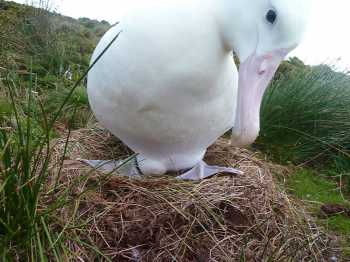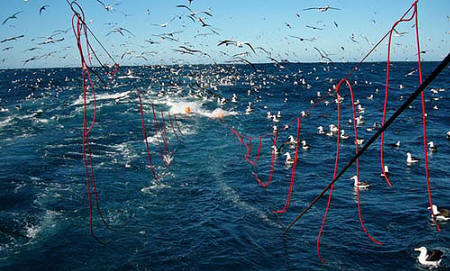A number of ACAP-listed albatross and petrel species visits Namibian waters in the south-east Atlantic, including the Critically Endangered Tristan Albatross Diomedea dabbenena from Gough Island (click here).

Tristan Albatross, photograph by Katrine Herian
These visitors are at risk to Namibian trawl and longline fisheries as recently reported by BirdLife International’s Albatross Task Force: “[i]n Namibian waters alone, more than 30,000 seabirds are drowned every year due to long-line and trawl fishing, making these fisheries some of the most destructive in the world (click here).
BirdLife also reports that the problem is now being addressed by the voluntary use of bird-scaring (tori) lines. These lines are being constructed by a group of five women in Walvis Bay, known as Meme Itumbapo, bringing needed employment.

Twin bird-scaring lines deployed behind a southern African trawler
Photograph by Barry Watkins
“A total of 13 trawlers (about 15% of the trawl fleet in Namibia) have [sic] now purchased tori lines for voluntary use on their vessels, as well as 3 demersal long-line vessels (about 25% of the fleet). Steel weights that keep hooks out of the reach of albatrosses - funded by a Lucile and Packard Foundation project - are now in production for the longline fleet.”
Namibia drafted a National Plan of Action for Reducing the Incidental Catch of Seabirds in Longline Fisheries (NPOA-Seabirds) following Food and Agriculture Organization of the United Nations (FAO) guidelines (IPOA-Seabirds) over the period 2003-2007 but it has, as yet, not been formally adopted.
Namibia is not a Party to the Albatross and Petrel Agreement but has sent observers to its meetings in the past.
Click here for a related story in ACAP Latest News on Namibian use of bird-scaring lines.
John Cooper, ACAP Information Officer, 24 July 2014

 English
English  Français
Français  Español
Español